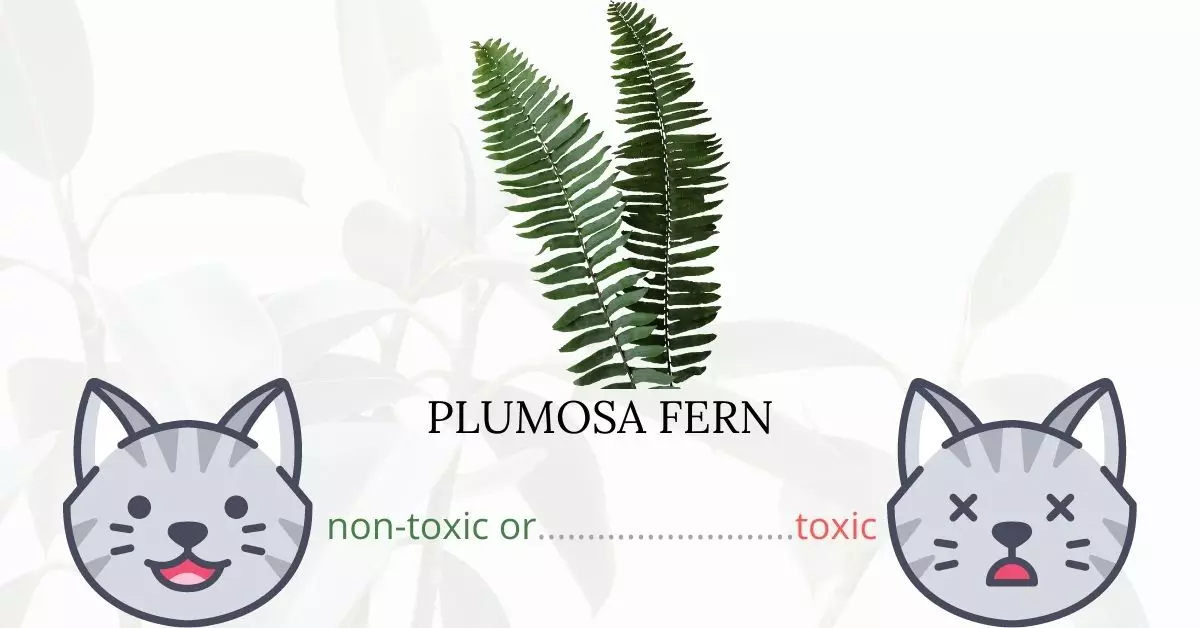Plumosa Fern, commonly referred to as Asparagus, Emerald Feather, Emerald Fern, Sprengeri Fern, Asparagus Fern, Lace Fern, Racemose Asparagus, and Shatavari, is indeed toxic to cats. This perennial vine contains saponins that can pose risks to feline health, especially when ingested. Notably, the berries of the plant tend to be more toxic than the leaves, potentially leading to symptoms such as vomiting, diarrhea, and allergic reactions in the mouth and throat. The severity of the symptoms often varies depending on factors like the size, overall health, and age of the cat.
It’s important to highlight that this article was crafted in collaboration with a team of experienced DVMs (doctors of veterinary medicine). Their expert insights and contributions have enabled us to provide accurate and up-to-date information concerning the potential risks associated with various plants, including the Plumosa Fern, and their implications on cats. Furthermore, to ensure the validity and comprehensiveness of our findings, we have conducted thorough research across high-authority websites such as ASPCA and PetMD.
Clinical Signs of Plumosa Fern Poisoning in Cats
The Plumosa Fern, with its intricate and lush green fronds, can be a visually appealing addition to any space, but it can pose serious health risks to cats. It is crucial to recognize the clinical signs of Plumosa Fern poisoning in cats, as early detection can help in administering appropriate treatment promptly.
- Vomiting: This is one of the primary signs that a cat may have ingested Plumosa Fern. The saponins found in the plant can irritate the cat’s gastrointestinal tract, leading to vomiting as the body tries to expel the harmful substances.
- Diarrhea: The irritants in Plumosa Fern, primarily due to the saponins, can disrupt the normal function of the cat’s digestive system, causing diarrhea as the body attempts to rid itself of the toxic elements.
- Abdominal Pain: Cats that have ingested parts of the Plumosa Fern may exhibit signs of discomfort and pain in the abdomen due to the irritation and inflammation caused by the plant’s toxic components.
- Contact Dermatitis: Even mere skin contact with Plumosa Fern can induce an allergic reaction in cats, leading to contact dermatitis. This condition may result in redness, itching, and inflammation of the skin.
- Allergic Skin Reactions: Besides contact dermatitis, other allergic skin reactions can also occur due to the cat’s skin being exposed to the plant, manifesting as rashes, blisters, or itchiness.
The berries of the plumosa fern are particularly concerning, being considered more toxic than the foliage and bringing about more severe reactions when ingested or contacted. Immediate veterinary attention is crucial if a cat is suspected to have come into contact with, or ingested, any part of the Plumosa Fern to avoid any serious complications or discomfort.
First Aid and Treatment of Plumosa Fern Poisoning in Cats
Treatment is largely symptomatic meaning the vet will treat the symptoms of your cat as they arise. Plant poisoning treatments usually involve procedures such as vomit-inducing, gastric lavage, administration of activated charcoal, and IV fluids.
Other medications and treatment may also be given by the vet as needed by the cat. Medicated shampoo may also be recommended for cats suffering from skin irritation and dermatitis.
Recovery from Plumosa Fern Poisoning in Cats
Sapogenin poisoning from plumosa fern ingestion usually has no long-term consequences due to its primary role as an irritant. This means that the majority of cats will recover quickly after treatment. Make sure your cat is at ease at home so that he or she can regain strength and fully recover as soon as possible.
Prevention of Plumosa Fern Poisoning in Cats
It is necessary to remove plumosa fern from the vicinity of your home. If you live in an area where these toxic plants are common, it is best to keep your cats indoors or never leave them outside unsupervised. You could also try putting up fences and putting up safety nets around your house. Keep yourself informed by learning about toxic and non-toxic plants for cats.
If you love plants but have cats at home, check out these lists:





